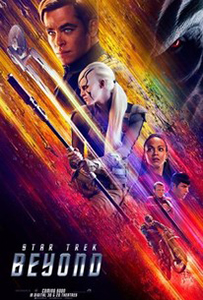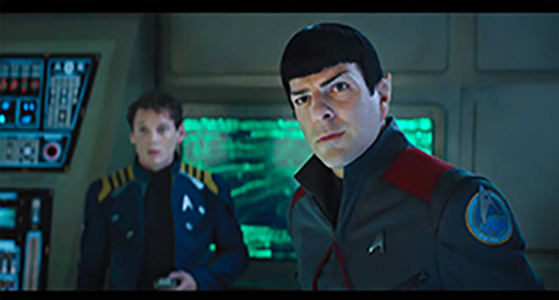The revival of the Star Trek franchise has centered on a more action-oriented focus, and while this approach has ingratiated the movies to a modern audience, it is not without its flaws. Among a fan base that considers Star Trek to be the “thinking person’s” science fiction, the lack of truly engaging scripts at the expense of increased explosions and punching is troubling.
With Justin Lin taking over the director’s chair for “Star Trek Beyond,” the action quotient is ramped up even further. Lin, best known for rebooting “The Fast and the Furious,” has never been one to pass on an action montage in favor of character development. This becomes problematic when the best parts of your film are the relationships between the characters and the dynamics of the cast. “Star Trek Beyond” is at its best when it focuses on the down-to-Earth moments between the characters. Unfortunately, those moments are only secondary distractions to the spectacle.
The USS Enterprise crew explores the furthest reaches of uncharted space, where they encounter a new ruthless enemy who puts them and everything the Federation stands for to the test. (Synopsis by Paramount)
This is far from being a bad movie, but it ends up being a disappointing movie by focusing too heavily on the wrong parts of the script. Opening the film is a series of characters questioning their life arc and their mortality. What a great jumping-off point to explore the character’s psyches against a backdrop of space exploration, right? There are some great built in metaphors with that setup. Instead, that idea is completely ignored except as bookends for a fairly standard disaster-action plot line? Both probably could have been done serviceably well. That’s the rub; there is a better movie here that could have been less focused on writing to a franchise and more focused on writing a good film.
But, to be fair, this is a franchise and it’s to be expected that nothing will deviate too far from center. “Star Trek Beyond” plays so straight down the middle that, at points, it becomes boring. Everyone knows how all of this is going to end. Without any surprise, there is no danger. Without the danger, there is no suspense. Without the suspense, there is nothing to make the audience care. So why not take some risk? There is a writing trick in which, as a starting point, the worst possible scenario is created for a character. Then you have to figure out how the character resolves that problem. What we get here is the safest option for each character—or at least nothing that is truly risky. It destroys the illusion of authenticity in the action sequences and prevents true audience engagement.
Even ignoring the lack of danger, there’s another problem. The best part of these films by far has been the interpersonal relationships between the characters. “Star Trek Beyond” does write a clever little twist into these relationships by forcing “odd couple” pairings when the crew gets stranded. These moments shine not just due to the strength of the cast, but also since the characters have slowly morphed into a representation of the original actors’ characters over the course of the last three films. There is a nostalgia effect that subtly works better than all the space explosions combined. Putting these characters together this way also allows for a different exploration of the theme teased in the opening. We get some of this, but much of it gets pushed aside to get to the next action sequence. In fact, much of this film feels as if the script is trying desperately to keep up with the next space battle.
It’s no surprise that this is a somewhat “safe” film—nothing significant was going to happen, in order to protect the franchise. The plot will neatly wrap itself up by the end. Everyone will resolve their existential crisis so that they have to stay on as the crew, because the franchise needs it to happen. This isn’t a bad film, but it isn’t a particularly interesting one either. Trying to spice it up by dialing the action up to absurd levels isn’t going to solve this. It’s a film best described as a shoulder shrug.
“See It/ Rent It/ Skip It”: Rent it. The Bones-Spock relationship and quips are on point. A whole spin-off where the two of them have to share a space apartment would be infinitely more enjoyable.
TWO and a HALF STARS out of four.
Directed By: Justin Lin
Rated PG-13 for sequences of sci-fi action and violence.
Runtime: 2 hrs.
Trailer
?





I liked it.
I thought the question of “mortality” that Zachery Qunito’s Spock character referenced was a tribute to Leonard Nimoy, as Nimoy Reboot Prime Spock character was shown to have died early on in the film (again, another tribute).
As a die-hard Star Trek fan, I thought the movie was great. It’s not perfect, but it was easy to follow and I thought it was a good adventure. It was refreshing that they used a new plot-line instead of changing an older plot-line from TOS.